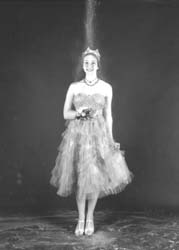|
News
|
|
|
Perspectives
|
|
|
Arts
|
|
|
Sports
|
|
|
Other
|
|

Photographer Abbe Explores Sources of Her Art
by Nick Stillman

|
|
A Portrait of the Artist: Brie Abbe's work explores, among other themes, race and the female figure. (photo by Brie Abbe) |
During her time at Oberlin, senior Brie Abbe has developed into one of Oberlin's finest young artists. In her "White Girl" series, her photographs focus on the female figure, portraying it unconventionally through innovative constructed images. Editor-in-chief Nick Stillman sat down with Abbe to discuss photographic theory, the state of her photography today and the direction she'll take in the future.
Nick Stillman: Why did you choose photography as your medium for artistic expression? Did it happen kind of by default or did you consciously decide photography was the thing for you?
Brie Abbe: I started when I was 15. I'm from Vermont and went to a public school with amazing arts. I kind of wanted to get on the visual art boat, so I took a couple of 2-D intro classes and I sucked at them - to the point of ninth grade deep depression. Then my father gave me an old camera and I took a photo class and realized all the energy I had inside I could articulate and make clear with photography.
NS: Do you think photography has more appeal to people than, say, painting or sculpture, because it's generally more objective?
BA: I wouldn't say it's more objective, but I would say it's more accessible to everyone. A lot of people think they have to know something about painting or sculpture to have opinions, whereas I think everyone can read photography.
NS: Do objective, "realistic" photos bore you?
BA: They don't bore me at all. The only kind of photography that bores me is dishonest photography where the intentions aren't clear to the artist. No kind of photo can bore me just because it belongs to a genre. It has a lot to do with honesty.
NS: Is there a consistent ideology behind your work?
BA: It's constantly evolving - I hope. Right now, the most important work to me deals with whiteness and discourse on race consciousness. Up until that body of work, which I started last year, almost all my work dealt with gender, sexuality and the body, and that definitely hasn't disappeared, but is overshadowed by this new discourse I'm working in. Performance is also really important to me and I see photography as a kind of performance.
NS: In most of the photos of yours I've seen, the focus has been primarily on the human form. Why is that?
BA: A lot of people say 'landscapes bore me,' and need to have people in their photos to interest them. I'd say the same thing. It has a lot to do with my roots - in high school, when I started taking pictures, I had a group of friends who were very willing to be models. That intrigued me and I'm still trying to perfect that. It's also true to say that almost all my photos are constructed images and almost never spontaneous - I need to think ahead. It tends to be female figures almost always.
NS: That was my next question. Why the consistent concentration on the feminine?
BA: I work with female figures because I've always been more comfortable with them. I never know how to work with the male body.
NS: Have you ever tried?
BA: I have, but I don't have a body like that so I'm just less comfortable with it.
NS: Who's your favorite photographer?
BA: I love Joel Peter-Witkin, Sally Mann, Julia Margaret-CameronŠThey're all black and white and they all work in large format (I think), and they all do constructed images, which kind of goes hand-in-hand with large format.
NS: Will photography continue to be important to you after graduating, and in what direction do you see your work going?
BA: I can't imagine something so intense just dropping off, but on the other hand, I'm afraid to leave Oberlin because I know the facilities and environment make it easy for me. I'm worried that financial challenges will put a damper on my work. I'm definitely not going to grad school right now, but I'm sure a couple years down the road I will.
Copyright © 2000, The Oberlin Review.
Volume 129, Number 8, November 10, 2000
Contact us with your comments and suggestions.